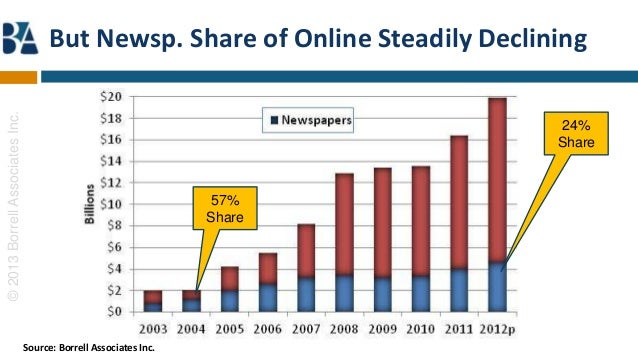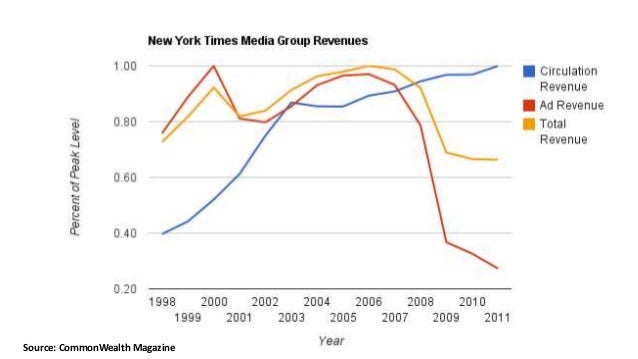Online newspapers are starting to see real revenues from online advertising. Still not enough to replace what the print version's lost - but frankly that's not coming back, as advertiser's have found better outlets. And it's starting to look like paywalls for online newspapers may be viable for some - but at what cost of online advertising? A recent presentation by Gordon Borrell of Borrell Associates looked at the issue.
More than 450 U.S. online newspapers have adopted paywalls to date, up from 300 in 2012 and 10 in 2010. On the other hand, 95% of local news websites remain free - TV and radio have largely rejected paywalls, as have local and hyperlocal alternative news sites. When paywalls first go up, web traffic falls 20-40%, but if there is a free access provision, many users eventually return (if not as frequently).
 In the meantime, online advertising revenues are booming, and are now the biggest advertising segment,surpassing both newspapers and TV (which briefly supplanted newspapers). However, online newspapers get less than a quarter of online local advertising revenues (23.6% in 2012). Looking over time, though, that share is shrinking.
In the meantime, online advertising revenues are booming, and are now the biggest advertising segment,surpassing both newspapers and TV (which briefly supplanted newspapers). However, online newspapers get less than a quarter of online local advertising revenues (23.6% in 2012). Looking over time, though, that share is shrinking.When it comes to the lean-forward medium of online, the mass-media news model doesn't work very well...In addition, eye-tracking research is showing that online readers have learned to tune out banner ads.
That's because local advertisers seek buyers in the online arena, not readers.
Thus, online newspaper advertising is looking less and less valuable to advertisers.
The good news for local news outlets is that people are interested. Almost three quarters (72%) say they follow local news most of the time. The bad news is that they've gotten used to getting it for free, so about three quarters of "news enthusiasts" indicate that they're unwilling to pay for local news. And the number's higher among more casual local news users. If you follow the numbers, that suggests online newspapers behind paywalls are unlikely to attract more than 15-20% of their market audiences - readership levels below what print editions are still getting. That's not likely to be a big draw for advertisers.
 Consider the NY Times Group revenue sources, plotted against their peak values. Ad revenues peaked in 2000, showed early signs of decline before falling precipitously in 2007. While the decline's slowed in the last few years, it dropped below 30% of peak levels in 2011. On the other hand, subscription revenues have been slowly growing since 2005, so essentially it's peak is this now (or at least until it starts falling). But the gain in subscription revenues hasn't kept pace with advertising loses, so total revenues have fallen. since 2007.
Consider the NY Times Group revenue sources, plotted against their peak values. Ad revenues peaked in 2000, showed early signs of decline before falling precipitously in 2007. While the decline's slowed in the last few years, it dropped below 30% of peak levels in 2011. On the other hand, subscription revenues have been slowly growing since 2005, so essentially it's peak is this now (or at least until it starts falling). But the gain in subscription revenues hasn't kept pace with advertising loses, so total revenues have fallen. since 2007.
Thus, erecting paywalls is likely to further damage the ability of online newspaper sites to generate local online advertising revenues. So you might think that erecting paywalls is a bad idea. But Gene Borrell argues that it isn't:
- Ad revenue per print reader is ten times what it is for a unique visitor;
- Low value and demand for online newspaper banner ads isn't likely to increase to match
- Free online newspapers contribute to eroding print readership
- Paywall subscriptions can be a good supplemental revenue source (not a replacement)
Source - Will Newspaper Paywalls Kill Web Advertising? Research presentation from Borrell Associates


Thanks for your valuable post.I would like to say Newspaper reading is the effective way to keep the mind sharp and too knowledgeable about latest news and trends. Advertisement in newspaper keeps us advertised about special offers and newspaper considered as an excellent advertising medium especially in India.Click on below link to know more
ReplyDeletelatest news india
This comment has been removed by a blog administrator.
ReplyDeleteThis SITE is information is soGREAT,
ReplyDeleteadvertise online free
This is my first visit to your blog! We are a team of volunteers and new initiatives in the same niche. Blog gave us useful information to work. You have done an amazing job. Please coming site instagram viewer to know more information about instagram
ReplyDelete